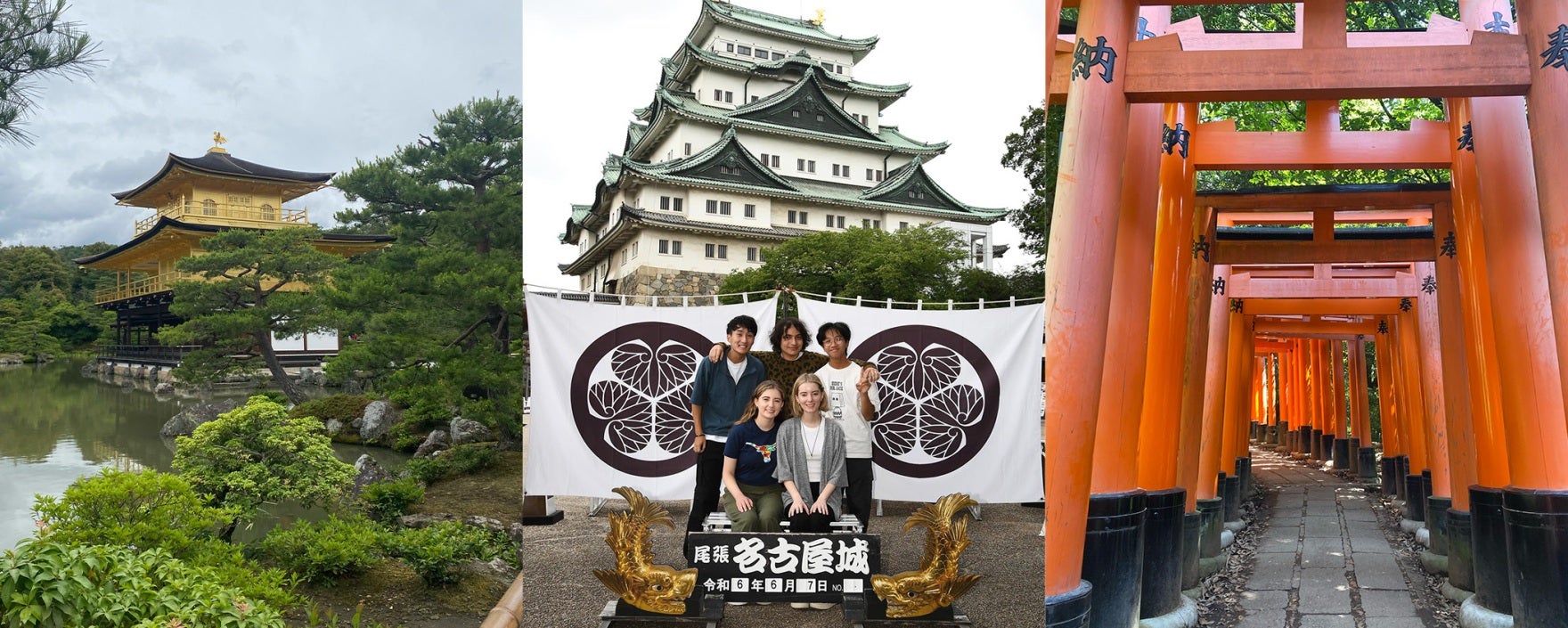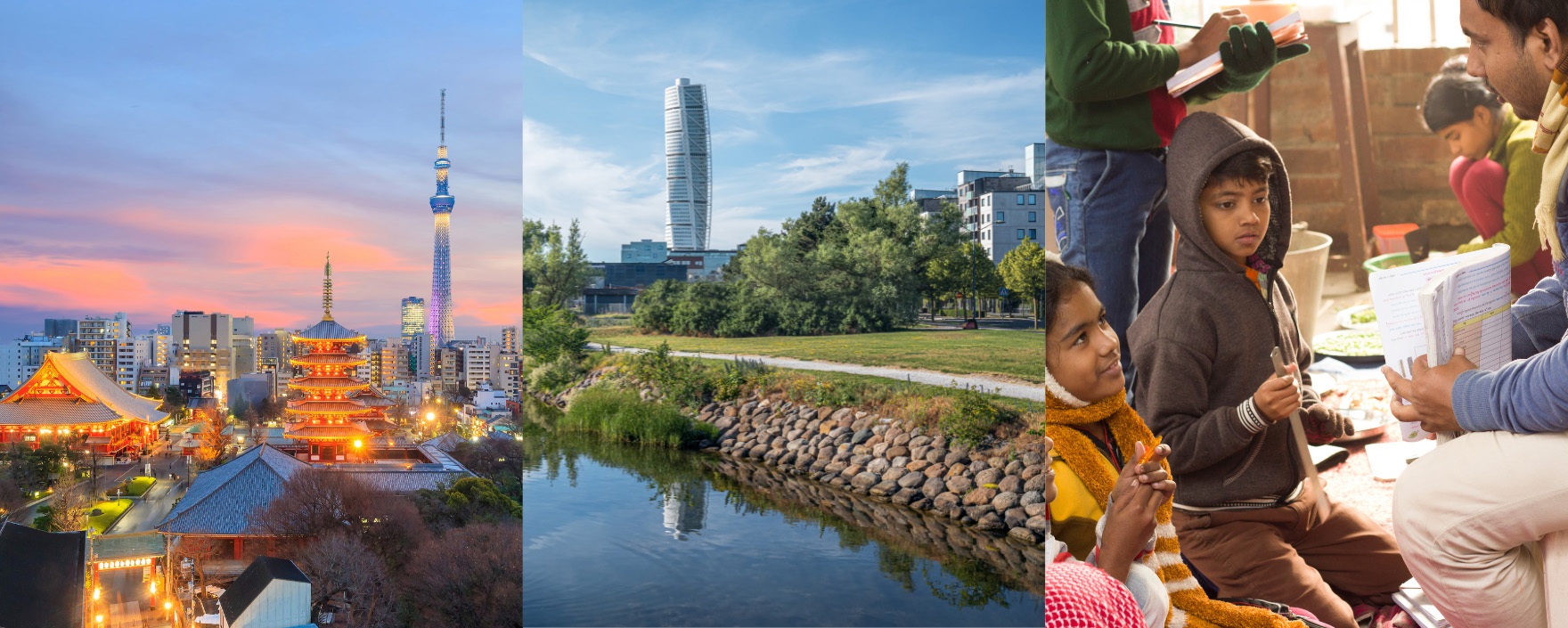Sep 14, 2018
 We are excited to announce the 14 finalist teams for the inaugural year of the President’s Award for Global Learning. The President’s Award for Global Learning is the signature program of the International Board of Advisors, a select group of influencers, who together with the President Gregory L. Fenves and senior leadership of The University of Texas at Austin are working to expand UT’s global network.
We are excited to announce the 14 finalist teams for the inaugural year of the President’s Award for Global Learning. The President’s Award for Global Learning is the signature program of the International Board of Advisors, a select group of influencers, who together with the President Gregory L. Fenves and senior leadership of The University of Texas at Austin are working to expand UT’s global network.
Through a competitive process, seven teams of students and faculty mentors are selected to pursue interdisciplinary projects relating to international research, social impact, and entrepreneurship in regions throughout the world. The teams work with international partner organizations, traveling together to implement their projects and gain hands-on experience.
There were 28 proposals during the President’s Award first round of applications from teams comprised of 98 students representing 10 colleges and 64 faculty representing 14 colleges. A review committee of faculty from colleges and schools across campus reviewed the submitted proposals and selected 14 finalist teams.
The finalist teams will participate in a pitch competition in October hosted by a panel of judges selected by President Fenves. From the 14 finalist teams, one award winner per region will be selected for a total of seven winning teams. Each member of the runner-up teams will receive an award of $1,000. The final awardees will receive up to $25,000 toward project implementation costs, as well as additional travel and academic financial support.
The finalist teams by region are:
Africa
The Color Complex
Explore the influences of colorism in Ghana through the lenses of media and businesses; identity and sense of self-worth; the cyclical nature of skin bleaching in families; and social mobility.
- Student team members: Timia Bethea, Rebecca Chen, Christina Cho, Vida Nwadiei
- Faculty team members: Prof. John Doggett, Dr. Kevin Cokley, Dr. Minette Drumwright
Rapid Detection of Arsenic Contamination in Drinking Water in Ethiopia using a Novel Paper-Based Dipstick Sensor Technology
Employ a new, paper-based colorimetric sensor technology to address arsenic contamination in drinking water in southwestern Ethiopia.
- Student team members: Samantha Beck, Wesley Christensen, Megan Soetaert
- Faculty team members: Dr. Simon Humphrey, Dr. Philip Bennet, Dr. Catherine Weaver
East Asia
A Global Study of Assessing and Treating Hearing Loss
Improve the accessibility of treatment for individuals in auditory rehabilitation through a mobile application in China.
- Student team members: Haoyang Li, Karis Paul, Xiaochun Wang, Shimin Zhang
- Faculty team members: Dr. Chang Liu, Dr. Richard Meier
A New State of Mind: Mental Health in South Korea
Explore whether culturally grounded intervention programs, through the use of a mobile app and in-person workshops, can have an impact on people’s opinions on mental illness and suicide in South Korea.
- Student team members: Andrew Chen, Patience Ojionuka, Elena Ordonez, Shaina Owens
- Faculty team members: Prof. Jiwon Park, Dr. Soyoung Park
Europe, Russia and the Caucasus
Democratic Dialogues: Youth, Social Media, and Political Engagement in Ukraine
Explore the ways in which Ukrainian youth utilize social media to engage in politics in connection with the March 2019 Ukrainian presidential elections.
- Student team members: Abigail Kuchek, Matt Maldonado, Lauren Nyquist, Maya Patel
- Faculty team members: Dr. Mary Neuburger, Dr. Oksana Lutsyshyna, Dr. Jeremy Suri
Lowering Maternal Mortality Rates: What Texas Can Learn from the Republic of Georgia
Helping Texas reduce its maternal mortality rate by examining successful methods in Georgia.
- Student team members: Anastasiya Byelousova, Parth Gupta, Michael Sanchez, Lyndsey Wang
- Faculty team members: Dr. Amy Liu, Dr. Sharmila Rudrappa
Mapping Language Mixing in Europe and Beyond
Creating programming language and collecting linguistic data on multilingual societies in Europe with a project focus in Germany.
- Student team members: Sunkulp Ananthanarayan, Elizabeth Green, Florian Janke, Devesh Singh
- Faculty team members: Dr. Barbara Bullock, Dr. Almeida Jacqueline Toribio, Dr. Ramesh Yerraballi
Latin America
Exposure – Diversifying The Classical Music Canon: Giving A Voice To The Silenced Musicians of Cuba
Promote the works of minority composers and musicians in Cuba to increase representation in the classical music industry.
- Student team members: Chelsea Daniel, Olivia Lynch, Katia Osorio, Peyton Young
- Faculty team members: Dr. Robin Moore, Prof. Andrew Garrison, Prof. Kristin Wolfe Jensen
Health and Housing: A Comprehensive Needs Assessment of Low-Income Communities in Puebla, Mexico
Comprehensive assessment of health needs, determinants, and resources in underserved regions of Puebla, Mexico, focusing on aspects of the built environment (housing, water and air.)
- Student team members: Christina Ciaburri, Veronica Remmert, Claire Stephenson
- Faculty team members: Dr. Ricardo Ainslie, Dr. Timothy Mercer, Dr. Peter Ward
Middle East and Central Asia
Project Oasis: What Texas can Learn from Water Conservation in the Negev
Encourage Texans to save and reuse water with known, viable methods used by the resourceful communities of the Negev Desert of Israel.
- Student team members: Maria Gonzalez, Kenwoo Kim, Chris Morphis, Pooja Trivedi
- Faculty team members: Dr. David Eaton, Dr. Molly Polk, Dr. Kenneth Young
Women’s Hygiene, Empowerment and Research for Social Impact (HERS)
Analyze and address empowerment through the creation and study of appropriate, sustainable menstrual hygiene products for women in refugee camps in Lebanon.
- Student team members: Ishani Chakravarty, Edith Muleiro, Priya Ramamoorthy, Kathryn Taylor
- Faculty team members: Dr. Janet Ellzey, Dr. Noël Busch-Armendariz, Dr. Katherine Polston
South Asia
Clearing the Air: Using Scalable, Low-cost Sensors to Address India’s Air Quality Knowledge Gaps
Distribute low-cost sensors to measure air pollution in India.
- Student team members Advaitha Byereddy, Shayan Charolia, Heather Howton, Brian Mai
- Faculty team members: Dr. Joshua Apte, Dr. David Eaton
Income for Freedom from Trafficking: Entrepreneurship for Rohingya Refugee Women
Reduce risk of human trafficking by establishing microenterprises for women in refugee camps in New Delhi.
- Student team members Anita Basavaraju, Sriram Palepu, Oluwaseun Ibitoye
- Faculty team members: Dr. Mike Findley, Dr. Heather Hindman
Southeast Asia
Addressing Cambodia’s Waste Management Challenges: A Proposal for Co-Generating Entrepreneurial Solutions with Local Communities
Test a pilot educational model in communities and encourage shifts in cultural views on waste while teaching the tools needed to generate solutions.
- Student team members Simran Ali, Eunise Chen, Katelyn DeBacker, Lingyu Kong
- Faculty team members: Dr. Jenny Knowles Morrison, Dr. Lucy Atkinson, Dr. Kasey Mariko Faust
To learn more about the President’s Award, visit
presidentsglobalaward.utexas.edu or email
presidentsaward@austin.utexas.edu.
 We are excited to announce the 14 finalist teams for the inaugural year of the President’s Award for Global Learning. The President’s Award for Global Learning is the signature program of the International Board of Advisors, a select group of influencers, who together with the President Gregory L. Fenves and senior leadership of The University of Texas at Austin are working to expand UT’s global network.
Through a competitive process, seven teams of students and faculty mentors are selected to pursue interdisciplinary projects relating to international research, social impact, and entrepreneurship in regions throughout the world. The teams work with international partner organizations, traveling together to implement their projects and gain hands-on experience.
There were 28 proposals during the President’s Award first round of applications from teams comprised of 98 students representing 10 colleges and 64 faculty representing 14 colleges. A review committee of faculty from colleges and schools across campus reviewed the submitted proposals and selected 14 finalist teams.
The finalist teams will participate in a pitch competition in October hosted by a panel of judges selected by President Fenves. From the 14 finalist teams, one award winner per region will be selected for a total of seven winning teams. Each member of the runner-up teams will receive an award of $1,000. The final awardees will receive up to $25,000 toward project implementation costs, as well as additional travel and academic financial support.
The finalist teams by region are:
We are excited to announce the 14 finalist teams for the inaugural year of the President’s Award for Global Learning. The President’s Award for Global Learning is the signature program of the International Board of Advisors, a select group of influencers, who together with the President Gregory L. Fenves and senior leadership of The University of Texas at Austin are working to expand UT’s global network.
Through a competitive process, seven teams of students and faculty mentors are selected to pursue interdisciplinary projects relating to international research, social impact, and entrepreneurship in regions throughout the world. The teams work with international partner organizations, traveling together to implement their projects and gain hands-on experience.
There were 28 proposals during the President’s Award first round of applications from teams comprised of 98 students representing 10 colleges and 64 faculty representing 14 colleges. A review committee of faculty from colleges and schools across campus reviewed the submitted proposals and selected 14 finalist teams.
The finalist teams will participate in a pitch competition in October hosted by a panel of judges selected by President Fenves. From the 14 finalist teams, one award winner per region will be selected for a total of seven winning teams. Each member of the runner-up teams will receive an award of $1,000. The final awardees will receive up to $25,000 toward project implementation costs, as well as additional travel and academic financial support.
The finalist teams by region are:



